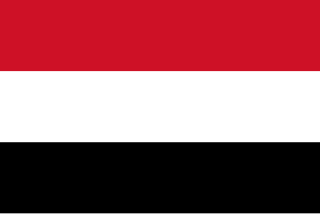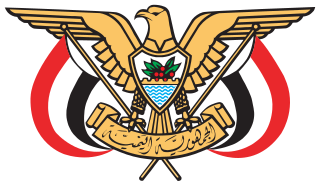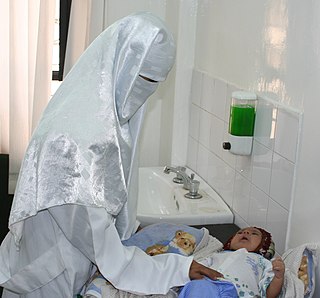
Yemen,officially the Republic of Yemen,is a sovereign state in West Asia. Located in the southern Arabian Peninsula,it borders Saudi Arabia to the north,Oman to the northeast,and the Indian Ocean to the south,sharing maritime borders with Eritrea,Djibouti and Somalia across the Horn of Africa. Covering roughly 528,000 square kilometres,with a coastline of approximately 2,000 kilometres,Yemen is the second largest country on the Arabian Peninsula. Sanaa is its constitutional capital and largest city. Yemen's estimated population is 34.7 million,comprised mostly of Arab Muslims. It is a member of the Arab League,the United Nations,the Non-Aligned Movement and the Organisation of Islamic Cooperation.

The president of the Republic of Yemen is the head of state of Yemen. Under the Constitution of Yemen,the president is also the Supreme Commander of the Armed Forces and head of the executive branch of the Yemeni government.
Human Rights in the UAE are substantially restricted. The UAE does not have democratically elected institutions and citizens don't have the right to change their government or form political parties. Activists and academics who criticize the government are detained and imprisoned,and their families are often harassed by the state security apparatus. There are reports of forced disappearances of foreign nationals and Emirati citizens,who have been abducted,detained and tortured in undisclosed locations,and denied the right to a speedy trial and access to counsel during investigations by the UAE government. Human Rights Watch states that Emirati laws maintain capital punishment and discriminate against women,migrants and LGBT individuals.

Human rights in Yemen are seen as problematic. The security forces have been responsible for torture,inhumane treatment and even extrajudicial executions. In recent years there has been some improvement,with the government signing several international human rights treaties,and even appointing a woman,Dr. Wahiba Fara’a,to the role of Minister of the State of Human Rights.
Mashhour Ahmed Mashhour was an Egyptian Engineer,he was the Chairman of the Suez Canal Authority.

Women in Yemen have historically been placed at a disadvantage due to their gender,with a highly patriarchal society. Although the government of Yemen has made efforts that will improve the rights of women in Yemen,many cultural and religious norms,along with poor enforcement of this legislation from the Yemeni government,have prevented Yemeni women from having equal rights to men.

Abdrabbuh Mansur Hadi is a Yemeni politician and former field marshal of the Yemeni Armed Forces who served as the president of Yemen from 2012 until 2022,when he stepped down and transferred executive authority to the Presidential Leadership Council,with Rashad al-Alimi as its chairman. He was the vice president to Ali Abdullah Saleh from 1994 to 2012.

Tawakkol Abdel-Salam Khalid Karman is a Yemeni Nobel Laureate,journalist,politician,and human rights activist. She leads the group "Women Journalists Without Chains," which she co-founded in 2005. She became the international public face of the 2011 Yemeni uprising that was part of the Arab Spring uprisings. In 2011,she was reportedly called the "Iron Woman" and "Mother of the Revolution" by some Yemenis. She is a co-recipient of the 2011 Nobel Peace Prize,becoming the first Yemeni,the first Arab woman,and the second Muslim woman to win a Nobel Prize.

Atiaf Zaid Al-Wazir is a Yemeni researcher,human rights activist,citizen journalist and blogger and co-founder of the media advocacy group Support Yemen. Al-Wazir lived in Tunis,Tunisia then she is currently in Brussels,Belgium.
Major general Mahmoud al-Subaihi is a Yemeni military officer. He served in the cabinet of President Abdrabbuh Mansur Hadi as defence minister. In the Yemen Army,he holds the rank of major general. He was appointed to head the Ministry of Defence by Prime Minister Khaled Bahah in November 2014.

The Yemeni civil war is an ongoing multilateral civil war that began in late 2014 mainly between the Rashad al-Alimi-led Presidential Leadership Council and the Mahdi al-Mashat-led Supreme Political Council,along with their supporters and allies. Both claim to constitute the official government of Yemen.

On 26 March 2015,Saudi Arabia,leading a coalition of nine countries from West Asia and North Africa,launched an intervention in Yemen at the request of Yemeni president Abdrabbuh Mansur Hadi,who had been ousted from the capital,Sanaa,in September 2014 by Houthi insurgents during the Yemeni Civil War. Efforts by the United Nations to facilitate a power sharing arrangement under a new transitional government collapsed,leading to escalating conflict between government forces,Houthi rebels,and other armed groups,which culminated in Hadi fleeing to Saudi Arabia shortly before it began military operations in the country.
Iona Craig is a British-Irish freelance journalist. Since 2010 her reporting has focused on Yemen and the Arabian Peninsula.

War crimes and human rights violations,committed by all warring parties,have been widespread throughout the Yemeni civil war. This includes the two main groups involved in the ongoing conflict:forces loyal to the current Yemeni president,Abdrabbuh Mansur Hadi,and Houthis and other forces supporting Ali Abdullah Saleh,the former Yemeni president. Al-Qaeda in the Arabian Peninsula and the Islamic State of Iraq and the Levant have also carried out attacks in Yemen. The Saudi-led coalition,backed by the United States and other nations,has also been accused of violating human rights and breaking international law,especially in regards to airstrikes that repeatedly hit civilian targets.
The following is a timeline of the Yemeni civil war,which began in September 2014.
Bahia Al Mardini is a Syrian Kurdish Researcher in International Law,PHD in Law,MA degree Northampton University in England,writer,and journalist.

The Marib campaign,also called Marib offensive,is an ongoing military campaign taking place in the Yemeni civil war for the control of the Marib Governorate of Yemen. Fighting between the Houthi forces and factions of the Yemeni Army loyal to Supreme Political Council on one side,and Yemeni Army units loyal to president Abdrabbuh Mansur Hadi and militiamen on the other side,took place since early 2015. Marib is rich in oil and gas resources and is a key strategic governorate because it connects the Houthi-controlled Sanaa and Alimi-controlled Hadhramaut governorates.

The Anad base drone strike was a Houthi attack carried out on 10 January 2019 in the Lahij Governorate near the southern port city of Aden. The strike killed six people attending a military parade,including the head of Yemeni Intelligence,and wounded at least 25 military personnel including a number of senior officers from the Yemeni army,the country's chief of staff,and a government official.

Nihal Naj Ali Al-Awlaqi is a Yemeni lawyer. She was the Yemeni Minister of Legal Affairs from 9 January 2016 to 17 December 2020. In 2016 she received the International Women of Courage Award.
Events in the year 2021 in Saudi Arabia.













